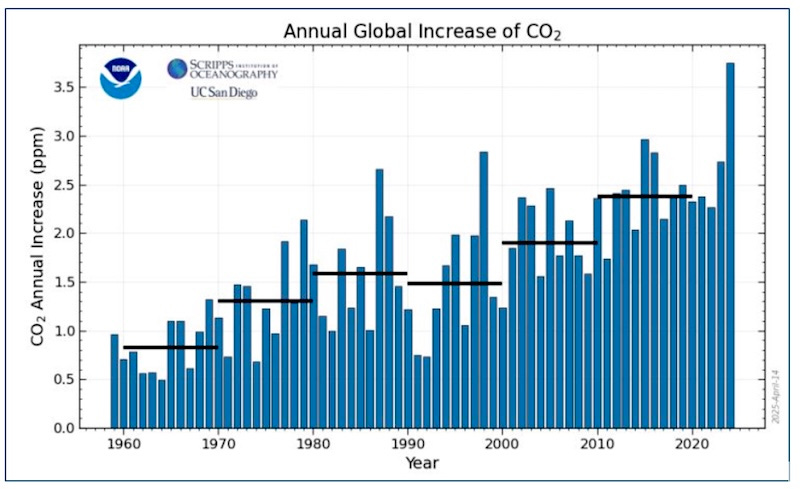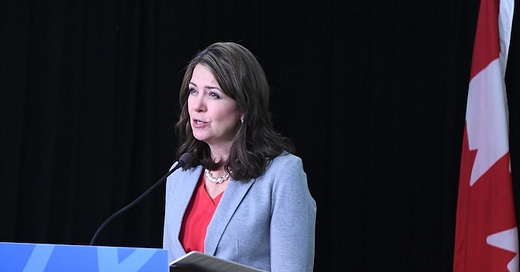Don’t Be Thrown Off by Danielle Smith’s Latest Bluster. We Can’t Afford the Distraction.
The Alberta Premier's post-election taunts made Pierre Poilievre look gracious by contrast. Her latest ultimatum to the rest of Canada wastes valuable time when our country’s survival is at stake.
If I told you that Pierre Poilievre showed up on the side of generosity and good manners in the continuum of reactions to last week’s federal election, you would probably think I was an impostor from some weird alternate universe.
Or, a bit more believably, that The Weekender had been hacked.
But one of the many unexpected and improbably storylines we witnessed Monday night was the sight of the now-former MP for Carleton—best known for 21 years of in-your-face political pugilism, coffee dates with “freedom” convoy occupiers, and photo ops with delusional members of the Diagalon conspiracy cult—looking downright decent compared to one of his usual political soulmates.
That would be Alberta Premier Danielle Smith, who seized on the election as an opportunity to lay down her latest ultimatum to the rest of Canada, all in the guise of congratulating Prime Minister Mark Carney on his election win.
No one would usually accuse Pierre Poilievre of being gracious. But in his concession speech Monday night, he acknowledged the election result—a little thing but a big thing, and not something to take for granted from the side of the political spectrum where election denial is now taught in schools. He also appeared to shut down supporters in the crowd who didn’t react well when he congratulated Carney, admonishing them that “tonight, we come together as Canadians” (sequence begins at 5:05).
By contrast, Smith’s reaction to this past week’s bombshell election results reminded us that there’s a bigger, at the moment more entrenched internal threat to Canada, and to the dialogue and unity of purpose that keep us strong.
‘Future Hostile Acts’
When you read Smith’s morning-after communiqué, the first question you want to ask is…who does this?
After devoting 14 words to congratulating Carney and emphasizing his minority government, Smith spends another six sentences thanking Poilievre and berating the previous Liberal government. “While Liberals and New Democrats demeaned and demonized Albertans, our values, and our industries for political gain,” she declared, Poilievre “made empowering Albertans and our [fossil] energy sector a cornerstone of his campaign.”
But she was just getting started. Here’s the inspiring, open-handed language Smith chose to invite Carney to “reset the relationship between Ottawa and Alberta with meaningful action rather than hollow rhetoric”:
A large majority of Albertans are deeply frustrated that the same government that overtly attacked our provincial economy almost unabated for the past 10 years has been returned to government.
As Premier, I will not permit the status quo to continue. Albertans are proud Canadians that want this nation to be strong, prosperous, and united, but we will no longer tolerate having our industries threatened and our resources landlocked by Ottawa.
Smith pledged that Albertans “will have an opportunity to discuss our province’s future, assess various options for strengthening and protecting our province against future hostile acts from Ottawa, and to ultimately choose a path forward.” That same day, she introduced an electoral reform measure that will make it easier for a smaller number of Albertans—just 177,000 people, CBC says, or 3.5% of the province’s population—to launch a separation referendum.
Biting the Hands that Feed You
If the stakes weren’t so high and the timing so bad, it would be amusing to compare Smith’s manufactured victimhood against the actual record. Here are some examples of the deep persecution Smith and her supporters have faced from the rest of Canada.
• The Trudeau government bought us all a pipeline when Kinder Morgan, the corporate offspring of the scandal-ridden Enron empire, decided the project no longer made economic sense. The cost of the Trans Mountain pipeline expansion has since ballooned to $34.2 billion, $875 for every Canadian or $3,500 for a family of four, and the line still isn’t being fully used.
• Before and during the election campaign, Smith, Poilievre, and their fossil industry allies kept hammering away at the dozen oil and gas megaprojects that were supposedly undercut by federal hostility and red tape. One recent inventory went long to make the point that those projects were either withdrawn under the authority of Harper-era environmental regulations, cancelled because world oil prices were low or gas markets were glutted, killed off by provincial policy, or scuttled by insufficient consultation with Indigenous nations.
Smith’s incessant posturing reminds me of the moment in 2016 when then-Calgary mayor Naheed Nenshi talked about the baked-in impulse to blame provincial leaders for the economic hardship Alberta was facing at the time, brought on by a price crash that began in 2014. “People seem to think [then-premier] Rachel Notley wakes up every morning and sets the world price of oil,” he said in mock wonder. “But everyone knows Justin Trudeau does that!”
Fast forward nearly a decade, and if Danielle Smith and her team are really interested in sustaining energy—not just fossil energy—as an economic “cornerstone”, why did they kill off a thriving renewable energy industry with a surprise moratorium in 2023, at a time when the province was leading the country in new solar and wind installations? Why did they follow the moratorium with a set of rules and regulations so arbitrary and opaque that they’re driving investors away?
But Smith Touts Separatism
But why do anything to solve a real problem like climate change or local energy security when you can take up all the oxygen in the room with another fabricated crisis? Especially when the solutions you could be pursuing are anathema to the former employers who invested so heavily to get you elected?
“Alberta separatism is widely known as a likely losing proposition—Smith herself noted to media Thursday an Angus Reid poll in early April showed 25% support and 75% opposition,” CBC writes. “But what she wouldn't acknowledge is that her government has helped her province's separatist movement get much closer to what they were looking for” with her conveniently-timed reform package.
So you have to ask again…who does this? Smith is behaving like the rogue relative who shows up at a family barbecue, hogs the dip, embarrasses the kids, yells at the neighbours, kicks the dog (at least she doesn’t shoot the dog), then sulks when people aren’t inclined to do exactly what she says. Okay, sure—we all have at least one of those relatives and we know we still have to invite them to dinner. But do we really want them at the table?
In the days before the election, Sen. Paula Simons (ISG-Alberta) was out on LinkedIn with a response to the separatist playbook.
Guys, this is not something new. It's cyclical. And it's an old and tired argument. The vast majority of Albertans are fiercely patriotic. We have no interest in quitting Confederation, nor in joining the United States. And I'm tired of all the attention paid to a minority of malcontents.
Mark Carney and Pierre Poillievre were both raised and educated in Alberta, and have emphasized their Alberta bona fides. Whatever happens on Monday, we will arguably have an Albertan PM. And yet, the mainstream media keeps platforming separatists and sharing their stale grievances—which in turn, spooks investors who might want to be putting their money into Alberta.
“The surest way to wreck a provincial economy is to talk about separation,” agreed Todd Hirsch, former chief economist at ATB Financial, in a more recent post. “The federal Liberal Party has not been a friend of Alberta's energy industry. And Prime Minister Carney must do better. But to claim Alberta has been devastated by the last 10 years of Liberal policy is ridiculous.”
If every pipeline project proposed in the last decade had gone ahead, Hirsch added, Alberta would be richer but less diversified, and with oil prices falling again, “we’d probably be in a recession already.”
But the arguments against Smith’s toxic posturing go far beyond economic concerns. In a post yesterday, Anna Murphy, a self-described advocate, community-builder, and leader in Wainwright, Alberta, had an intensely homegrown reaction to Poilievre running in a byelection in her home riding of Battle River–Crowfoot after losing his seat in suburban Ottawa.
I know firsthand the strength and resilience of our neighbourhoods. Places like Camrose, Oyen, Czar, Consort, Viking, Irma, Empress, and many more. I can tell you—we deserve better.
Albertans deserve more than divisive rhetoric and political posturing. We deserve leaders who care more about people than power…
But what we’re seeing from Pierre Poilievre and Danielle Smith isn’t leadership, it’s self-interest wrapped in soundbites that distract from the real issues facing every day Albertans. The only thing broken about Canada are those trying to tear it apart for their own political gain.
Indigenous Communities Hold the ‘Strongest Card’
What if another province tried to pull the same shtick?
We already have an answer to that question, and it isn’t the one Smith appears to want.
“This is not the first time First Nations have led the fight against separatist movements,” APTN wrote Friday. “The separatist movement in Quebec gained traction in the late ’70s with a referendum on the question in 1980 and again in 1995. Many French-speaking residents of Quebec argued they had a distinct history, religion, traditions, and cultural identity from the rest of the country. Both referendums failed.”
The Cree Nation Government and Grand Council of the Crees (Eeyou Itschee) helped lead the fight, recalled former executive director Bill Namagoose, a member of the Waskaganish Cree Nation. “There’s no such thing as a right to self-determination for a city or a province—it belongs to the people. To the nation,” he told APTN. “I think that’s the strongest card, the only card that we had to play in Quebec.”
On LinkedIn, Namagoose added:
…the province of Alberta is not a nation under international law and, therefore, does not have a right to self-determination. Alberta, as a province, is an administrative boundary within Canada’s boundaries. Only the international boundaries of Canada, the USA, and Mexico are protected by international law.
First Nations inside Alberta have the right to self-determination and can invoke that right in the event the Alberta Government wants to separate Alberta from Canada. The Cree Nation invoked their right to self-determination in the 1995 Quebec referendum.
The Cree Nation held its own referendum, and 98% of the Cree citizens voted to stay in Canada in the event Quebec seceded from Canada. That implied the partition of the province of Quebec.
A nation’s right to self-determination trumps provincial administrative boundaries.
On APTN, Cold Lake First Nations Chief Kelsey Jacko said the 17 chiefs in Treaty 6 will present a united front when they meet with Smith on Tuesday. “Treaty 6, 7 and 8—this is something we’ve always been fighting. We never gave up,” he said. “There’s no bill of sale for this land of Alberta-they call it. We had no say in the making of Alberta and Saskatchewan. They didn’t consult us.”
“You are attempting to manufacture a national unity crisis—by enabling a referendum on separatism and a fanatical cell of individuals—at the exact moment when Canadians need to unite against Donald Trump’s Americans,” Chiefs Sheldon Sunshine and Joe Tuccarro of the Sturgeon Lake and Mikisew Cree Nations told Smith in a joint media release. The treaties between Indigenous nations and the British Crown are “sacred covenants that are to last forever”, they added, and Alberta doesn’t have authority to “supersede or intervene” in that relationship, “even indirectly by passing the buck” to a citizen referendum.
We Really Don’t Have Time for This
It’s important to know that there’s a clear, legally defensible solution if Smith’s separatist provocations get out of hand. But, really, we don’t have time for the distraction. Pretty much everyone but Smith herself and her fellow Trump enthusiast Kevin O’Leary knows that Job One for Canada is to stand up to the U.S. president’s economic warfare and annexation threats.
And to get that done, as Carney has been hinting, in a way that pulls our economy toward faster decarbonization and builds trade alliances with “like-minded” countries that are doing the same.
The new PM insists he was elected to be pragmatic—if he finds that something is broken, he keeps saying, he’ll fix it. Danielle Smith is already doing her level best to make that agenda more complicated. It’s up to all of us to hold Carney to a high standard for listening to real community voices and getting the right stuff done, while ignoring or pushing back the familiar distractions on the horizon.
Mitchell Beer traces his background in renewable energy and energy efficiency back to 1977, in climate change to 1997. Now he and the rest of the Energy Mix team scan 1,200 news headlines a week to pull together The Energy Mix, The Energy Mix Weekender, and our weekly feature digests, Cities & Communities and Heat & Power.
Chart of the Week

Climate and Energy Experts React as Liberals Form Minority Government
RBC Abandons Green Finance Goal, Could Trigger ‘Domino Effect’
Pick a Lane, Practice What You’ve Preached, Climate Analysts and Advocates Urge Carney
Banking on LNG Exports is a High-Risk Gamble for Canada’s Future Growth
Trump Trade Policies Spell Trouble for U.S. Fossil Industry
Trump Administration Policies Spark Buying Spree for Low-Priced Clean Energy Stocks
Group Pushes Ontario to Cut ‘Dangerous Dependence’ On U.S. Gas Imports
District Court Judge Upholds The Hague’s Fossil Fuel Advertising Ban, Sets Example for Canada
Eight of the Top 10 Online Shows Are Spreading Climate Misinformation
Will offshore wind ever come to the Great Lakes? (Canadian Broadcasting Corporation)
New Brunswick government rethinks nuclear reactor plans (Globe and Mail)
Could the UK's Hinkley Point C nuclear plant be the most expensive power plant ever built? And the one that took the longest period to build? (Gerard Reid Substack)
Solar energy is growing fast in Canada, but panels are imported. Could we try to make them here? (Canadian Broadcasting Corporation)
Countries could use forests to 'mask' needed emission cuts: report (Agence France Presse)
Investment in sustainable infrastructure is key to financial resilience in a changing climate (World Economic Forum)
Insurance Crisis Compounded by Climate Change Threatens the Broader U.S. Economy (Inside Climate News)
EU Commission faces complaint over easing of sustainability rules (Reuters)
Russian LNG Phaseout Makes Room for US Supplies: EU's Costa (Bloomberg)
Germany’s climate conservatives give ‘green’ a patriotic rebrand (Euractiv)
Trump is trashing electric vehicles. China is building cars the world wants. (Washington Post)
Pacific island states urge rich countries to expedite plans to cut emissions (The Guardian)








Thanks for this. Excellent summary.
Excellent synopsis Mitchell. All Canadians, and Albertans in particular, need to pay attention to what she says and take her at her word. Look what happened when the US citizens thought tRump's rantings were all jokes. Elbows Up to the Indigenous peoples of Alberta and may their resolve sustain us all.